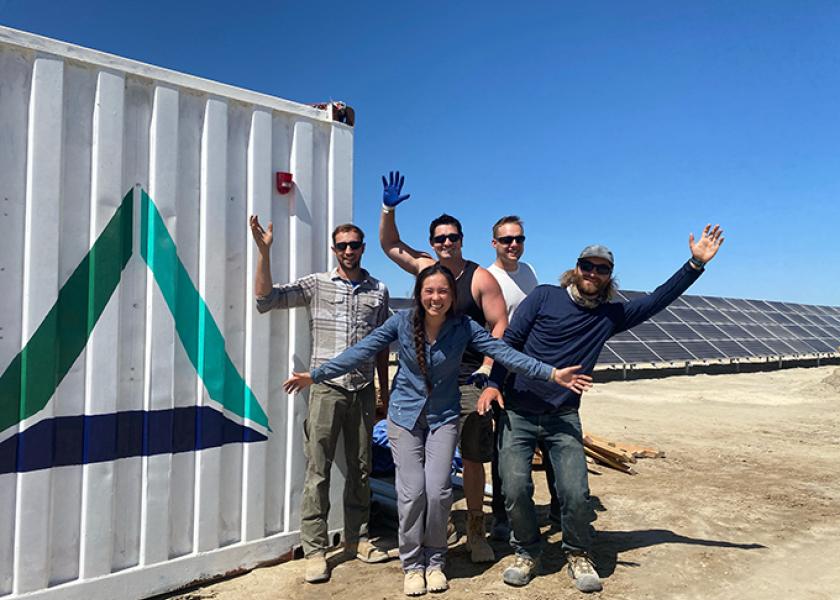An egg market analyst says highly pathogenic avian influenza (HPAI) is already causing disruptions...
Nitrogen Fertilizer Made Different Than Ever Before

Since 2018, startup Nitricity has been working to make fertilizer in a different way than ever before. The company refers to its process as “harnessing the power of lightning”. It has developed a system which requires three inputs: electricity, water, and air.
As CEO and Co-Founder Nicolas Pinkowski highlights, Nitricity has the key benefits of producing a less carbon-intensive fertilizer with local production closer to the farm, reducing the logistical demands. “At our core, our process just uses electricity. Our first test systems pulled the water from an irrigation system, charged it with nitrogen, and then reintroduced the water with our fertilizer product to be applied to the field. Using low-cost electricity from solar lets us offer the lowest cost fertilizer to growers,” he said.
The products of the system are nitric acid or calcium nitrate. The early prototypes have a 10- to 50-kilowatt solar array connected to the Nitricity on-site system housed in a shipping container. And there are no byproducts or waste from the nitrogen fixation process.
Pinkowski acknowledges this is an intentional departure from conventional fertilizer production to eliminate the reliance on fossil fuels, and the process produces one-step nitric acid.
The co-founders met at Stanford as their interests in renewable energy and fertilizer products converged.
Just recently, Nitricity announced a $20 million fundraising round, which brings the company’s total funding to $27 million to date.
“We want to go from prototypes to building a larger pilot system,” Pinkowski says. “The goal is to go from producing small volumes to creating tonnage for the first time.”
So far, Nitricity has worked in the western U.S. focusing on specialty irrigated crops such as tomatoes, berries, nuts and stone fruits.
“Our calcium nitrate product has the additional benefit of reducing blossom end rot,” Pinkowski says.
As for a business model, the co-founder says they are more focused on scaling up their system and remain open to selling smaller systems in the future with the right partner.
“We foresee a system where 50,000 acres to 100,000 acres could be serviced by one system. So, fertilizer could be produced within 50 miles of where it’s being used,” he says.
Also just announced is a collaboration of Nitricity with the International Fertilizer Development Center where greenhouse gas (GHG) emissions will be measured from its fertilizer production to soil application in a lab setting.
Joshua McEnaney, President, CTO and Co-Founder at Nitricity said, “This is an opportunity to attack not just the 1-2% of global GHG emissions in the production, but the additional 5% of GHG emissions in the application by mitigating nitrous oxide formation. We are pushing hard to scale up and implement this solution.”
Elemental Excelerator named Nitricity as a cohort member, which will include trials in almond orchards in partnership with Olam Food Ingredients, a global leader in natural food ingredients and raw materials.
EDITOR’S TAKE:
Given the current concerns over a lack of petroleum-based nitrogen and escalating costs at the farm gate, this development may offer some relief. The added bonus of lower greenhouse gas emissions, hence lower carbon footprint, would be a large benefit also. This type of innovation takes time and money to move from the scientist’s bench to large scale production. It appears they are moving in the right direction.
Since we know little about the cost to produce the nitrogen with this method in comparison with more conventional alternatives, it is too early to judge the impact this could have on both supply and price to farmers. We will keep an eye out for any further developments with this or other companies that may evolve.
In the meantime, farmers will continue looking for ways to minimize the impact of higher fertilizer costs to improve their margins. You should remind them that by leasing or purchasing a new or qualified used vehicle, they can take advantage of huge savings on fertilizer from AgroLiquid – one of our principal AgPack® partners that can help you close the deal.








